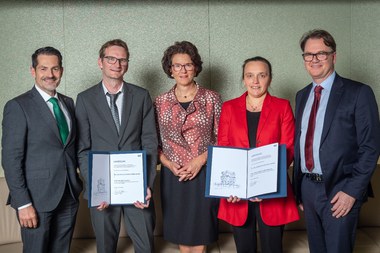Dr. Karl Wamsler Innovation Award 2023 for Veronique Van Speybroeck
(12-11-2023) Professor Veronique Van Speybroeck received the 2023 Dr. Karl Wamsler Innovation Award for her contributions to modeling nanoporous materials for catalysis and simulating complex chemical transformations at operating conditions.
Prof. Veronique Van Speybroeck was awarded with the Dr. Karl Wamsler Innovation Award 2023 on November 9, 2023. She received the price in appreciation of her leadership, uniting theory and practice in catalysis, pushing boundaries in simulation techniques to model materials and catalytic processes under real operating conditions.
Veronique Van Speybroeck is full professor at Ghent University and director/co-founder of the Center for Molecular Modeling, which is a multidisciplinary research center, grouping researchers from the faculties of Engineering and Architecture and Sciences with molecular modeling interests. The research is performed with a multidisciplinary group of scientists, having backgrounds in physics, chemistry, (bio-)engineering, materials science. She strongly believes in collaborations among researchers across disciplines and strongly stimulates such open vision as key to achieve scientific excellence.
Dr. Karl Wamsler Innovation Award
In honorable memory of the distinguished German chemist, Dr. Karl Wamsler, a formative personality of the German chemical industry, Clariant has donated the Dr. Karl Wamsler Innovation Award to the Technical University of Munich. The annual prize is awarded to scientists who have created innovative momentum with industrial potential in the field of catalysis, including bio-catalysis and White Biotechnology.
The jury considers groundbreaking work that has been documented in scientific journals or the patent literature, and which originated in an academic or industrial research environment. The award is endowed with 50,000 €.
The award was introduced in 2017 and is named after Dr. Karl Wamsler who died in 2016. Dr. Wamsler was one of the most important and formative figures in post-war German chemistry. He was also a generous patron when it came to supporting science and the arts and was named TUM Honorary Senator in 2015.

